Living with type 2 diabetes can be challenging. While managing blood sugar is the primary goal, some diabetes medications can also lead to weight loss. This can be a welcome benefit for people with type 2 diabetes who are also struggling with their weight. But it’s important to understand how these diabetes weight loss medications work and if they’re the right approach for you.
Understanding Diabetes
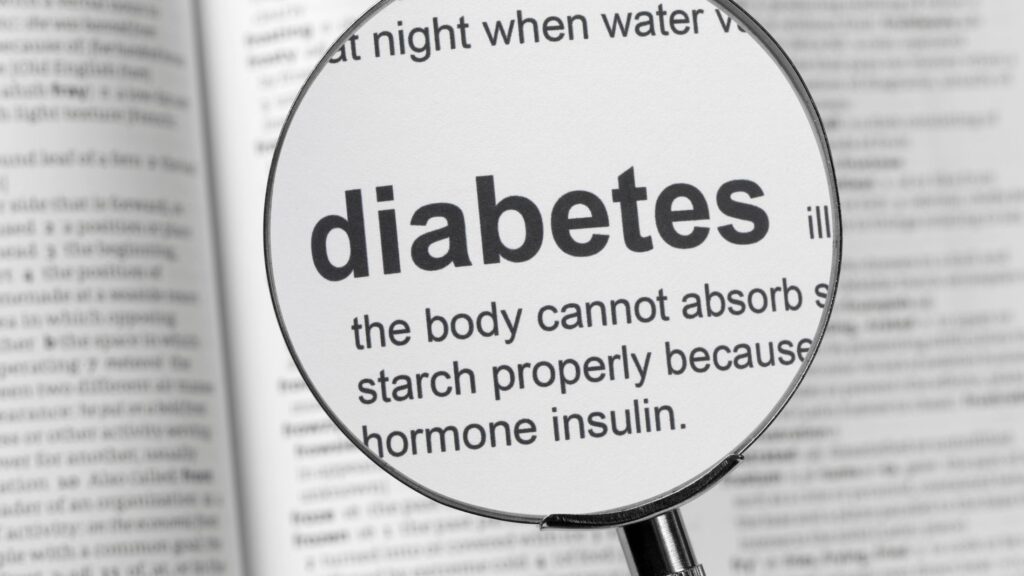
Diabetes is a chronic condition that affects how your body regulates blood sugar. There are two main types of diabetes:
Type 1 Diabetes
Type 1 Diabetes is a chronic auto-immune disease that causes a deficiency of insulin. Insulin is a hormone needed to maintain blood sugar at a healthy level. It moves the excess glucose from the bloodstream into your cells. A lack of insulin causes high blood sugar levels. This can lead to serious health complications. Type 1 diabetes usually develops in children but can also affect adults. There is no cure for type 1 diabetes. Patients with this condition need daily management with insulin injections.
Type 2 Diabetes
Type 2 Diabetes is a chronic condition caused by elevated blood sugar levels. Mainly, the body doesn’t produce enough insulin to maintain healthy blood sugar levels. Also, cells become resistant to insulin, they can’t take excess glucose from bloodstream. Type 2 Diabetes can be managed by medication and a healthy lifestyle.
Treating Type 2 Diabetes
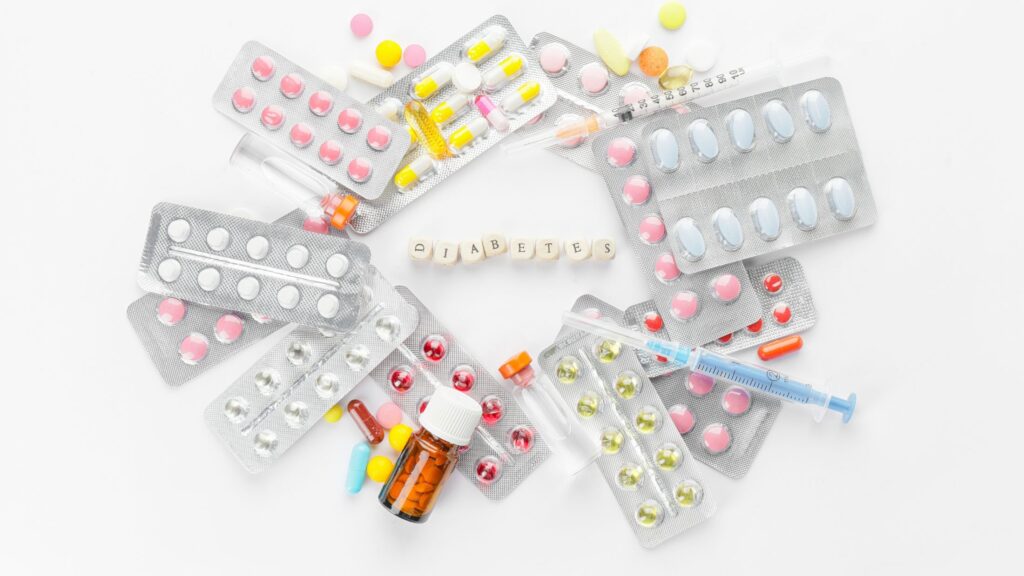
There are different classes of medications to help manage type 2 diabetes. They work in different ways to help manage blood sugar levels. Here’s a breakdown of common medication strategies to manage type 2 diabetes:
1. Direct insulin replacement
Insulin is a hormone that is essential for blood sugar levels management. In advanced cases of type 2 diabetes, patient may require supplementation of insulin. Insulin is injected directly into the bloodstream to maintain blood sugar under control.
2. Increasing insulin action
The first-line response for type 2 diabetes is Metformin. It is a biguanide agent known for its antihyperglycemic and insulin sensitizer actions. Metformin lowers blood glucose concentrations without causing hypoglycemia. Metformin acts by decreasing insulin resistance and making cells more sensitive to insulin. Glucose can then be absorbed from bloodstream and used as an energy source. Metformin also decreases the amount of glucose produced by the liver.
3. Stimulating insulin production
Some drugs can stimulate the pancreas to produce more insulin. Insulin then reduces blood sugar levels by activating the absorption of glucose. Two medication categories are known for this effect: Sulfonylureas and Meglitinides. They both work in a similar way by increasing insulin production. Meglitinides, however, have shorter duration of action compared to Sulfonylureas. They work by stimulating your pancreas to release more insulin. They cause low blood sugar levels.
Examples of Sulfonylureas are Gliburide (Glyburide), Glipizide (Glucotrol) and Glimepiride (Amaryl).
Examples of Meglitinides are Repaglinide (Prandin) and Nateglinide (Starlix).
4. Modulating incretin hormones
Incretins are a group of hormones produced in the gut. They play an important role in blood sugar regulation. The most important incretin hormone is Glucagon-like peptide-1 or GLP-1.
GLP-1 is a gut hormone with significant effects on the pancreas, intestine, and brain. It contributes to blood sugar control and weight management. This hormone plays an important role in diabetes weight loss medications. Here’s a breakdown of GLP-1 actions in each organ:
Pancreas
After we eat, GLP-1 stimulates insulin production from the pancreas. Insulin helps move glucose from bloodstream into cells, lowering blood sugar levels.
GLP-1 also interacts with pancreatic cells to decreases glucagon release. Glucagon is a hormone that raises blood sugar levels. The decrease of glucagon helps prevent excessive blood sugar spikes.
Intestine
GLP-1 may influence the release of gastric inhibitory polypeptide (GIP). GIP is a hormone that slows down the rate at which food moves through the stomach. GLP-1 slows down digestion leading to a more lasting feeling of fullness.
GLP-1 may also influence hormones involved in appetite regulation. GLP-1 reduces appetite leading to feelings of satiety and reduced desire to eat.
Brain
GLP-1 receptors are present in areas of the brain that control appetite. GLP-1 activates these receptors to signal fullness feeling and reduce eating desire.
GLP-1 may interact with the brain’s reward system, making high-calorie food less appealing.
Incretin system modulators act in two ways:
DPP-4 Inhibitors or Gliptins
Gliptins target an enzyme called DPP-4 and inhibit its action of GLP-1 breakdown. This leads to increased levels of circulating GLP-1 in the body. Blood sugar levels are then improved by the action of GLP-1.
Examples of DPP-4 inhibitors are Sitagliptin (Januvia), Saxagliptin (Onglyza) and Linagliptin (Tradjenta).
GLP-1 Receptor Agonists or Incretin mimetic drugs
These medications mimic the action of GLP-1. They stimulate GLP-1 receptors particularly in the pancreas. They produce an effect similar to GLP-1. This leads to increased insulin production and decreased glucagon release. GLP-1 Receptor agonists may also influence satiety by increasing fullness feeling.
Examples of GLP-1 Receptor Agonists are Liraglutide (Victoza), Dulaglutide (Trulicity) and Semaglutide (Ozempic).
5. Affecting Glucose Absorption and Excretion
SGLT2 Inhibitors
SGLT2 or sodium-glucose co-transporter 2 is a protein present in the kidney. It is responsible for reabsorbing glucose from the urine back into the bloodstream. SGLT2 inhibitors block your body’s ability to reabsorb glucose. Extra glucose in bloodstream passes through the kidneys and goes into your pee. This helps lower blood sugar levels.
Examples of SGLT2 Inhibitors are Canagliflozin (Invokana), Dapagliflozin (Farxiga) and Empagliflozin (Jardiance).
Alpha-Glucosidase Inhibitors
Alpha-Glucosidase are enzymes present in the small intestine. They break down carbohydrates into simpler sugars (glucose) for absorption. Alpha-Glucosidase Inhibitors delay the breakdown of carbohydrates in the intestine. This results in a slower rise in blood sugar levels after eating.
Acarbose (Precose) is an example of Alpha-Glucosidase Inhibitor.
Disclaimer: You must consult with your doctor before taking any diabetes medication. They will help you find the right approach for you. All diabetes medication should be used along with diet and exercise to lower blood sugar in adults with type 2 diabetes.
Diabetes Weight Loss Medications

The primary purpose of diabetes medications is blood sugar control. Some medications, however, can also be helpful for weight loss. Incretin mimetic drugs have emerged as a promising option for weight loss. They have particularly shown encouraging results, influencing appetite, satiety, and potentially calorie intake. Liraglutide and semaglutide are two important Incretin mimetic medications. They both work similarly by mimicking the effects of the natural GLP-1 hormone. However, they differ in brand names and FDA approvals.
It’s important to note that not all incretin mimetic medications are FDA approved for weight management.
Here is a break down of the most used medications and their approval status:
Victoza
Victoza (Liraglutide) is FDA approved to treat type 2 diabetes in adults and 10 years children or more. Victoza is typically injected once daily.
Saxenda
Saxenda (Liraglutide) is pecifically approved by the FDA for Chronic Weight Management. It’s a once-daily injection. Saxenda’s usage is limited to:
– Children 12 years or older, who weigh 132 pounds (60 kg) or more
– Adults who are obese (BMI ≥ 30 kg/m²)
– Adults who are overweight (BMI ≥ 27 kg/m²) with weight-related medical condition like high blood pressure or sleep apnea.
Ozempic
Ozempic (Semaglutide) is FDA-approved for type 2 diabetes management, in adults. It’s is typically injected once a week. Ozempic may cause weight loss as a side effect in some people. However, diabetes management is the only FDA-approved usage for this specific brand name.
Wegovy
Wegovy (Semaglutide) is FDA-approved for chronic weight management in adults with limitations:
– Obesity (BMI ≥ 30 kg/m²)
– Overweight (BMI ≥ 27 kg/m²) and weight-related co-morbidity.
Wegovy is typicaly once weekly or once monthly injection depending on the dosage.
Disclaimer: You must consult with your doctor before taking diabetes weight loss medications. He will help you find the right approach for you to manage your weight. These medications are not a Magic Bullet. They work best when combined with a healthy diet and regular exercise for sustainable weight loss.
Are Diabetes Weight Loss Medications Effective?
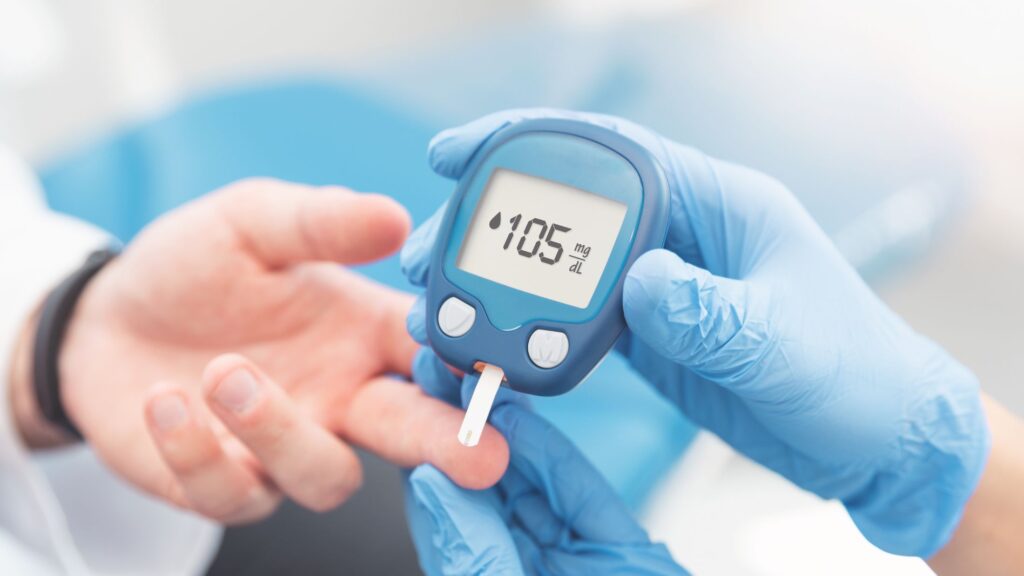
Who can benefit from diabetes weight loss medications?
Diabetes weight loss medications are actually not meant for weight loss. These medications are primarily prescribes for type 2 diabetes patients to manage their condition. However, weight loss is a notable side effect of these medications, which can be beneficial for some diabetes patients. Medication approved specifically for weight management share the same active agent with diabetes weight loss medications. They are mainly intended for obese and over weight patient with weight-related conditions.
How much weight can you lose?
Liraglutide and semaglutide were both significantly associated with weight loss in obese and overweight adults without diabetes. Studies on semaglutide for weight loss in people without diabetes show an average weight loss of 15.8% of body weight. Average weight loss with liraglutide was around 6.4%.
Similar trend was observed for type 2 diabetes patients using semaglutide, although the weight loss achieved was greater in patients without diabetes.
How long the weight loss effect last?
Studies found that GLP-1 receptor agonists medications can be effective for weight loss as long as you continue taking them. Patients without diabetes who were treated with semaglutide had a continued weight loss over 65 weeks. They were able to sustain their weight loss for up to 4 years.
Will you gain weight after stopping these medications?
After stopping semaglutide or liraglutide, it’s most likely to regain weight over time, especially without maintaining healthy lifestyle habits. A study on semaglutide found that after one year of discontinuation, participants regained two-thirds of the weight they had lost while on the medication. Lifestyle habits like diet and exercise play a crucial role in weight loss maintenance after stopping these medications. Individual factors like metabolism can also influence how much weight is regained.
Downsides of Using Diabetes Weight Loss Medications

Physical side effects
Semaglutide and liraglitude are well tolerated and safe. Studies support the long-term use of semaglutide for the treatment of overweight and obesity in patients without diabetes. However, like all drugs, liraglutide and semaglutide medications may have side effects. They vary depending on the individual and dosage. The most common side effects are gastrointestinal reactions. They include nausea, vomiting, diarrhea, bloating and heartburn.
Liraglutide and semaglutide injections may increase the risk of developing thyroid tumors. Animal studies suggest that they might stimulate growth of certain thyroid tumors. Data are however limited on the direct risk of causing tumors in humans. Discussing your medical history with your doctor is important before using these medications.
Financial cost
Liraglutide and semaglutide injections cost can be significant. These medications can be expensive, especially without insurance coverage. Coverage for these medications can vary depending on your insurance plan. For example, Ozempic cost on the manufacturer list price in the USA is over $950 per month. This is the price you would pay without any insurance coverage. Ozempic price in Autralia and european countries is significantly lower.
Shortage impacting diabetes patients
The use of semaglutide and liraglutide for weight loss has become popular. Some patients without type 2 diabetes or weight problems use them off-label. This popularity has led to a shortage of these medications. Diabetes patients who rely on these medications face difficulty to access them.
So, Is ozempic a magic bullet for weight loss?
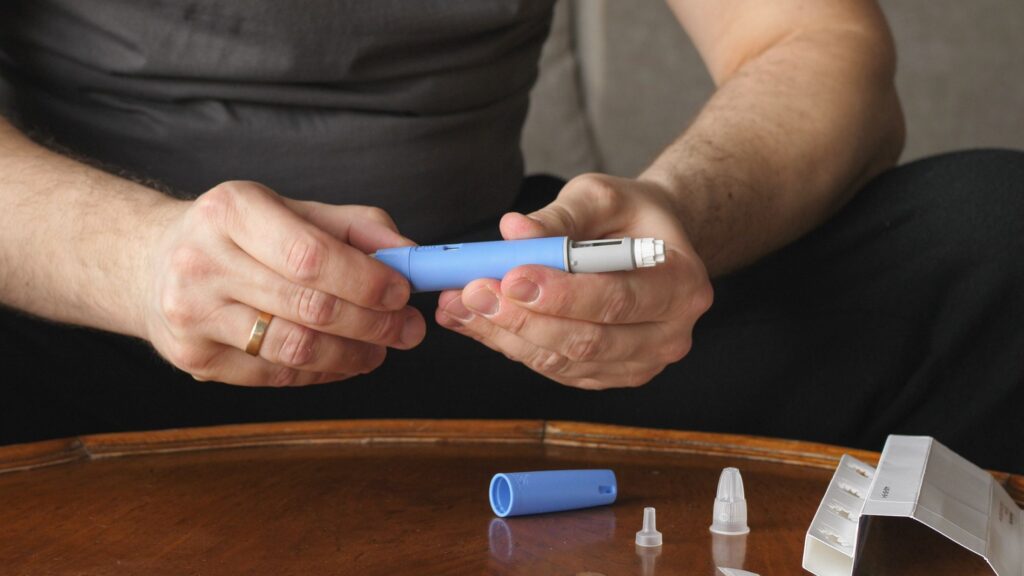
Ozempic is a semaglutide medication. It mimics the GLP-1 hormone to produce more insulin and reduces blood glucose. It also interacts with the brain to reduce appetite and signal a feeling of fullness.
Ozempic is currenty FDA approved for type 2 diabetes management only. Its usage is not approved for chronic weight management. However, some doctors may prescribe Ozempic off-label for weight management. Using diabetes weight loss medications off-label has risks and benefits that you should discuss with your doctor.
Wegovy is another semaglutide medication that is FDA approved for chronic weight management. It is similar to ozempic in pharmaceutical effect but it typically comes in higher dosage options. Wegovy is recommemded for obese or overweight patients with additional health conditions.
Ozempic isn not a magic bullet for weight loss. The same goes for Wegovy. These medications can be effective for weight management. But they are not a substitute for a healthy diet and exercise. When used under medical supervision, they can make a difference for many patients.
Bottom line
The primary role of diabetes medications like Ozempic and Victoza is to treat type 2 diabetes. Diabetes is a serious condition that can lead to complication when not treated.
If you are interested in using Ozempic for weight loss, first talk to your doctor. Consider alternatives like Wegovy or Saxenda if appropriate. Remember that diabetes weight loss medications are not a magic bullet. Create a safe and sustainable weight management plan that includes a healthy diet and exercise.

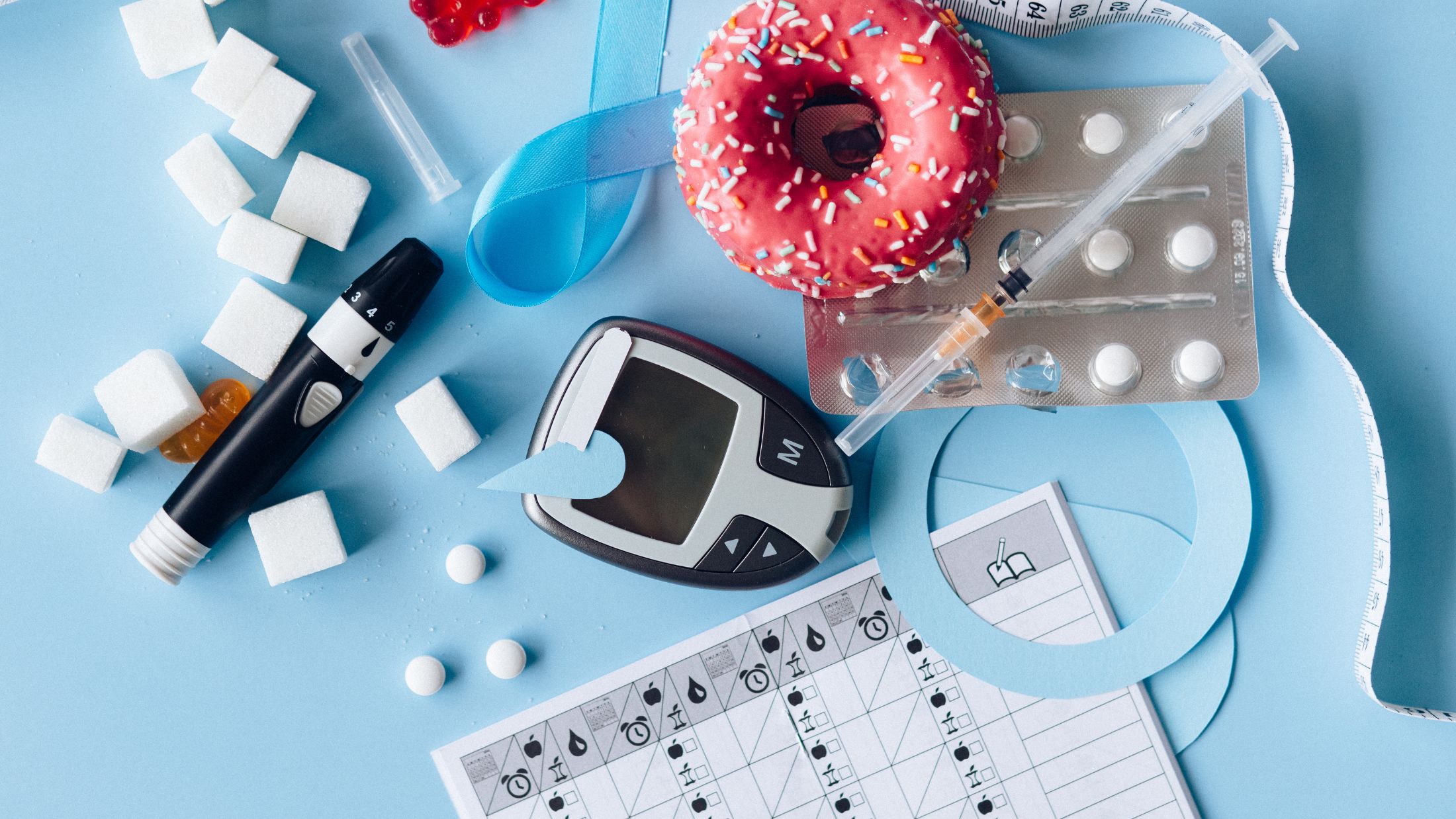


Leave a Reply